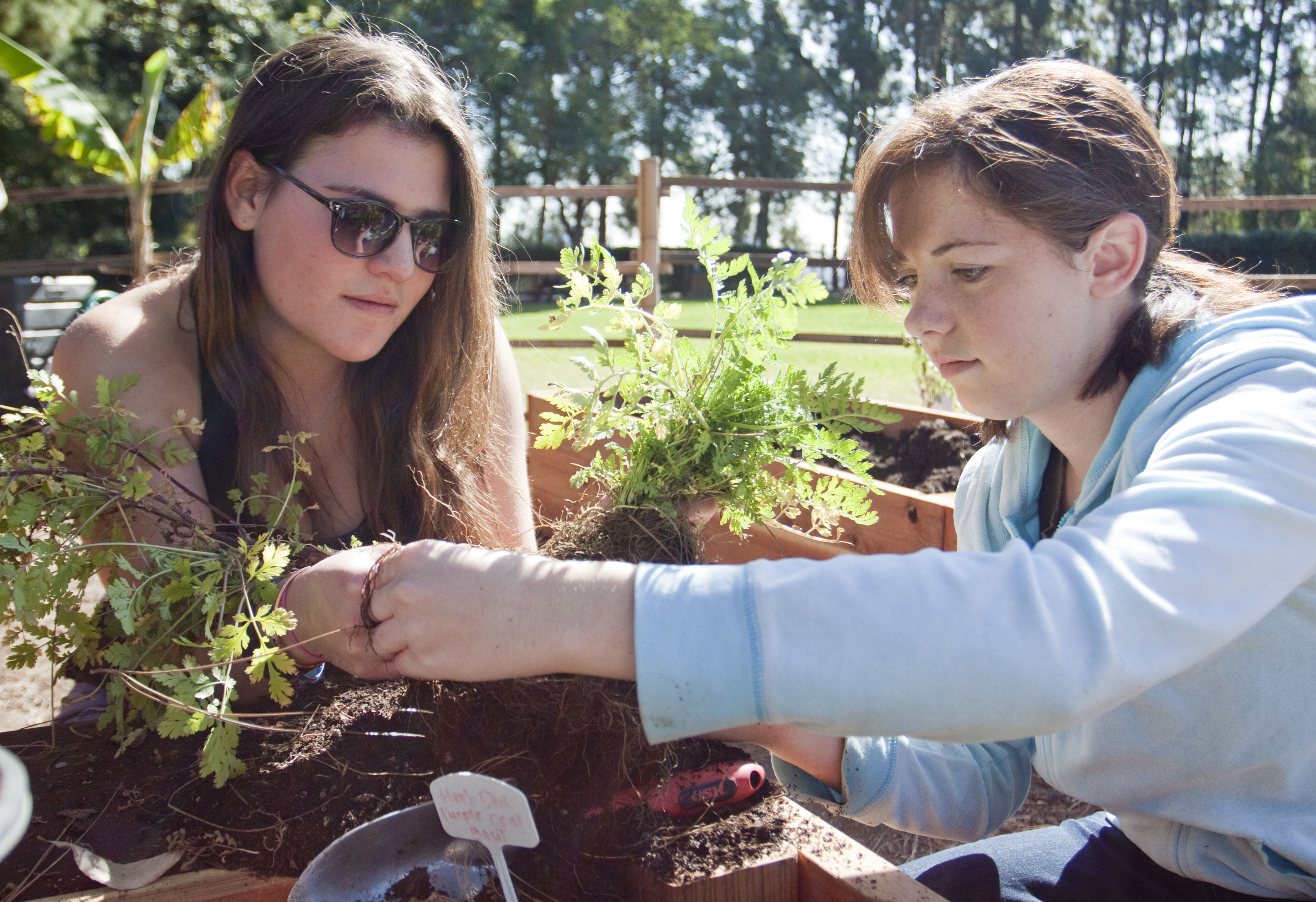Urban Agriculture class lets students do hands-on gardening, discusses LA food culture

Aviva Kraus, a fourth-year comparative literature and French student, and Brooke Pickett, a fourth-year environmental science student, separate plants in Sunset Canyon Recreation Center during their urban agriculture class, which includes garden maintenance as part of its curriculum.
By hong chen
Feb. 15, 2013 1:25 a.m.
The original version of this article contained multiple errors and has been changed. See the bottom of the article for additional information.
Students come and go, but Blaise is always there. Tucked away at the top of Sunset Canyon Recreation Center, you will find him, Blaise the scarecrow, whose bleached-blonde, ribbon-filled hair makes him stand out among all the colorful plants, fruits and vegetables in the student-run garden.
The garden was started in 2006 by the student group E3: Ecology, Equality, Equity; but its upkeep is temporarily a class project for students enrolled in Environment 188A: Urban Agriculture in Los Angeles.
This quarter is the first time the class has been offered at UCLA. It focuses on connecting students with their food sources and introducing them to the many food movements in the L.A. region, said Anne McKnight, a visiting assistant professor in the UCLA Department of Asian Languages and Cultures.
The topics covered in the course range from food justice to urban gardening and many other aspects of both activist and do-it-yourself food culture, McKnight said.
“(Gardening is) one of the ways to have a more healthy and generative relationship with our food rather than a disciplined, calorie-counting (one),” McKnight said.
UCLA set aside the space in the recreation center for students who wanted to do community gardening, said James O’Claire, a fourth-year East Asian studies student and E3 garden liaison.
McKnight, who received a doctorate degree in comparative literature from UC Berkeley, said she became interested in food while attending school in places with great food cultures, including Japan and San Francisco.
She began teaching about community gardening in 2010 at USC and started collaborating with E3 and working in their student-run garden as a University of California master gardener when she started teaching at UCLA in September 2011. To be certified as a master gardener, McKnight was required to set aside 50 hours in a year to teach underprivileged communities about sustainable gardening.
Last quarter, representatives from UCLA’s Healthy Campus Initiative approached McKnight about possibly teaching a class on food culture.
Interest in the class was immediate and many students could not be enrolled because of the class size being limited to 25 students, McKnight said. Her students visit the garden roughly every four classes and get to work in every part of the gardening process, which McKnight said includes planting and harvesting fruits and vegetables, as well as composting plant waste.
As she meticulously spaced out several radish plants, third-year environmental science student Maya Bruguera said she started composting and growing pea plants in her apartment since taking the class.
On the other side of the garden, Elizabeth Pieslor, a fourth-year English student, smelled four different basil plants before transplanting them so that their roots would expand.
“I was smelling them to identify them (because there is Thai basil and normal basil),” Pieslor said. “Also, I just like to smell things,” she said with a laugh.
Students also do hands-on work outside of the Sunset Recreation garden. In addition to assigned readings, papers and gardening, the course curriculum requires that students complete a couple of hours of fieldwork, McKnight said.
One student has participated in a fruit pick and redistribution in Arcadia, Calif. and another has volunteered at the Institute of Urban Ecology in Altadena, Calif., McKnight said.
McKnight said food is the movement of this day and age and the concepts of sustainability taught in the class can be applied by anyone at home.
“(The class) is a way to bring practicality, knowledge and classroom study together to create a result that’s both creative and practical – and I think that’s kind of rare,” McKnight said.
The progress in the garden is frequently updated by both students and McKnight on their blog, http://uclaurbanag.wordpress.com/
Email Chen at [email protected]
Correction: McKnight began teaching about community gardening in 2010 at USC. Also, to be certified as a master gardener, McKnight was required to set aside 50 hours in a year to teach underprivileged communities about sustainable gardening.


